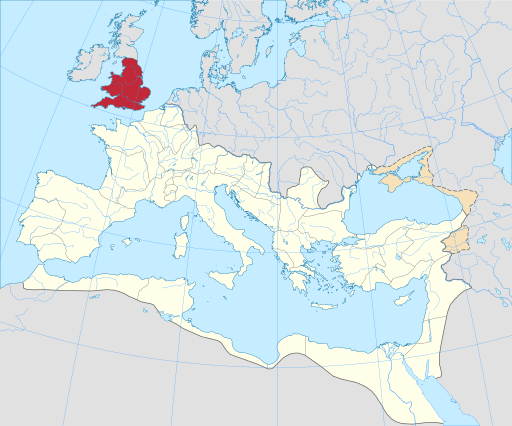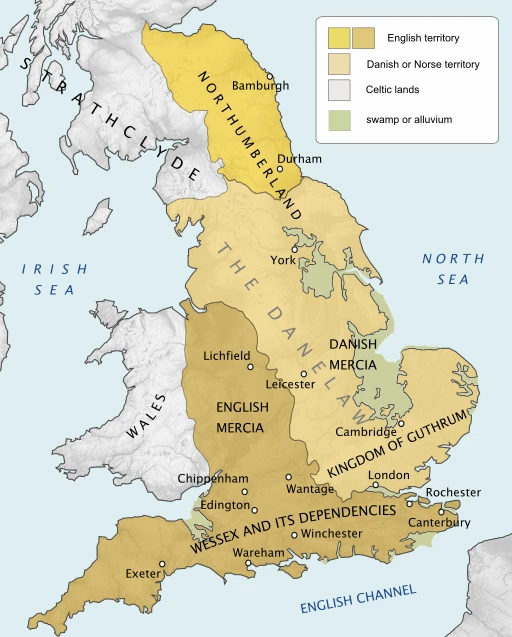If you have British ancestry, you might be wondering where "British blood" comes from. Is it Celtic? Germanic? Scandinavian?
In this post, we'll discuss some of the latest research on the genetic history of Britain, which will give you a better idea of where your British ancestors might have come from.
Who are the British descended from?
This is a much more complicated question than you might imagine. For a relatively small geographic area, the past few thousand years have seen a complicated history of invasions, migrations, commerce, and foreign rule, which left marks in the form of genetic diversity.
The genetic makeup of a person from Britain will depend on their family's unique history - including the geography of the part of Britain where their family is from.
By the end of this post, you'll have a good understanding of the various populations that ended up in Britain, and whether or not traces of these peoples can be found in modern DNA tests.
How did the first Brits get to Britain?
The general consensus among researchers is that the original human occupants of Britain arrived via a land bridge called Doggerland, which is now submerged below the North Sea. This area was flooded as recently as about 8,000 years ago.
We know that this is likely the way that ancient inhabitants of Britain arrived, but what is also interesting is that Doggerland was a settled, inhabited area. Study of the area is still in its infancy, but scientists, fisherman, and others have found extensive evidence that people actually lived on the land that is underneath the North Sea.
These first British inhabitants are often described as the Mesolithic British. Many people find it interesting that these first British residents likely had dark skin, light eyes, and were lactose intolerant - people descended from the Western European Hunter Gatherers.
According to a study published by Nature, the highest concentration of people who are most genetically similar to these original inhabitants are found in places within Wales.
What do genetic studies about Britain reveal?
There have been dozens, if not hundreds, of studies about the genetic ancestry of Britain. Some DNA studies focus on mitochondrial DNA, others on Y DNA, and others on autosomal DNA.
I generally focus on autosomal DNA on this website, so I would like to discuss the results of an Ancestry DNA study which analyzed the DNA of 5000 people in Britain to try to get an understanding of how genetically diverse the population is.
Autosomal DNA tests can test approximately 500 years back in history, so they can give us a good idea as to where our ancestors may have lived over the past 15 generations, approximately. This is much further back than most of us will ever be able to research on all lines of our family trees, so the information is interesting and helpful.
It should be noted that each generation, some autosomal DNA information is "lost", since we only inherit 50% of our DNA from each parent. This is still much more inclusive than the mtDNA or Y DNA tests, since those tests only test for a purely maternal or paternal line (i.e. your father's father's father's father's father's father's father) as opposed to a more comprehensive look at all of your ancestors on both sides of your family over the past few hundred years.
The results of the Ancestry study revealed that the average British resident has ancestry from the following regions (at the listed percentages):
- 36.94% Anglo Saxon
- 21.59% Celtic
- 19.91% Western European (French/German)
- 9% Scandinavian
How did Britain get its genetic diversity?
As I mentioned at the beginning of this post, Britain's history is complicated. Fortunately, science can help us sort out some of the major questions that we have about where "British blood" came from - and as you might be guessing, there really is no such thing as "British blood".
In reality, a person from Britain is more genetically diverse than people from many other parts of the world. For someone like me, a person interested in DNA testing, this is very relevant information.
I have significant British, Irish, and Scottish ancestry in my family tree, but only about 20% British DNA - and the explanation might be that my ancestor's ancestors just weren't as "British" as we might think.
Geography has a measurable effect on Britain's diversity
It turns out that there is good evidence that the average Brit's genetic makeup will vary depending on where his or her grandparents were from. Someone from the northwest of England might have significantly different ancestry than someone in the most northern part of Scotland - and they will both differ genetically to someone who is from Wales or Cornwall.
If we start looking at Britain's diversity, a good place to start would be with the Roman Empire. For about 400 years, the Romans ruled a sizeable portion of Britain that had previously been controlled by Celtic groups (see image below).
The Celtic groups had slowly migrated from Central Europe as recently as 500 BC, and these groups are the source of the Celtic DNA that can still be found in Ireland, Wales, Scotland, and England.
Roman Empire and British DNA
Most of the immigrants to Britain from the Roman Empire, along with soldiers and settlers, would have had substantial Mediterranean ancestry, but these individuals could have had roots from anywhere in the Roman Empire. The evidence of the Roman influence in Britain has been obtained primarily from Y DNA studies, using haplogroups to determine migration patterns.

Anglo Saxon British DNA
In the 5th century, many Saxons left Western Europe (primarily Denmark, Holland, and Germany) and went to Britain. These groups bear the primary responsibility for the deep Anglo Saxon roots of many modern day inhabitants of Britain, although there has been extensive contact between the two regions (Britain and Western Europe) in more modern history.
It can be very difficult to determine when a particular haplogroup ended up in a region (i.e. was it brought 1000 years ago, or recently by a modern descendant?).
Some parts of Britain were more vulnerable to the invading Anglo Saxon tribes, and this has been shown on genetic studies of Britain. People in Wales, for example, have more in common with their Celtic ancestors than the Anglo Saxon invaders.
The Viking effect on British genetics
Perhaps the most intriguing influence on Britain's genetics is the Scandinavian influence. A significant number of Danes (Danish Vikings) ended up living in what would eventually be called "Danelaw", after several decades of raids on coastal villages.
Danelaw was a sizeable portion of England (the entire northeastern part), and was ruled by the Vikings for about 200 years (see image below).
Additional Viking raids, battles, and settlements occurred within the interior of the non-Danish part of England during this period.
People with significant deep roots in the parts of England where Vikings settled and/or raided generally show more genetic similarity with Scandinavian DNA on genetic ancestry tests than people from other parts of Britain.

Do you want to know how your British roots will show up on a DNA test?
If you are curious about whether your British DNA will show up as more Anglo Saxon, Western European, Scandinavian, or Celtic, why don't you take a DNA test? It's the best way to get a definitive answer on what's in your DNA - you might be surprised by what you find!
My favorite DNA testing company is Ancestry DNA, since they test for the most specific regions - but Family Tree DNA, My Heritage DNA, and 23 and Me all offer reliable tests that can help you learn more about your family history.
If you want to order a DNA test from Ancestry DNA or Family Tree DNA, you can use the following links (I'll get a very small commission at no extra cost to you whatsoever - so thanks!):
- Discovery the story AncestryDNA® can tell
- Test your DNA using the Family Tree DNA Family Finder test
Conclusion
I hope that this post has given you some insight into the origins of "British blood", which we now understand is much more diverse than previously thought. If you have any questions, comments, or would like to add something to the discussion, I would love to hear from you in the comments below.
Thanks for stopping by!

Gary
Wednesday 26th of July 2023
So basically England north western means that English people are not English but made up of all dna like Scottish walsh French German Netherlands ect so we are made up with all this in our tree so we are not English if we get the England northwestern dna result but it diverse I think this is what your saying because I’ve got French ancestors that go to the 1500s France and Germany and Scotland Switzerland